Are you looking for a durable, easy-to-install, and stylish flooring solution? Do you want an alternative to traditional wall-to-wall carpeting? Are you searching for a low-maintenance option that works well in high-traffic areas?
Carpet tile, or modular carpet or carpet squares, is an innovative flooring solution that provides flexibility, durability, and ease of installation. Unlike traditional carpets, these tiles come in individual squares, making them easier to replace and maintain. They are widely used in offices, schools, hotels, and homes.
Carpet tiles are gaining popularity for their affordability, design versatility, and practicality. Let’s dive into everything you need to know about carpet tiles.
What is Carpet Tile?
Carpet tiles, also known as modular carpets or carpet squares, are small, square sections of carpet designed to be installed individually rather than as a single, continuous roll. These tiles come in various materials, styles, and backing types, making them versatile for different settings. These tiles are often used in commercial and residential spaces due to their easy installation, low maintenance, and ability to replace single sections rather than entire carpets.
Unlike traditional broadloom carpets, carpet tiles come in various materials, sizes, and backing types, making them versatile flooring options for different environments.
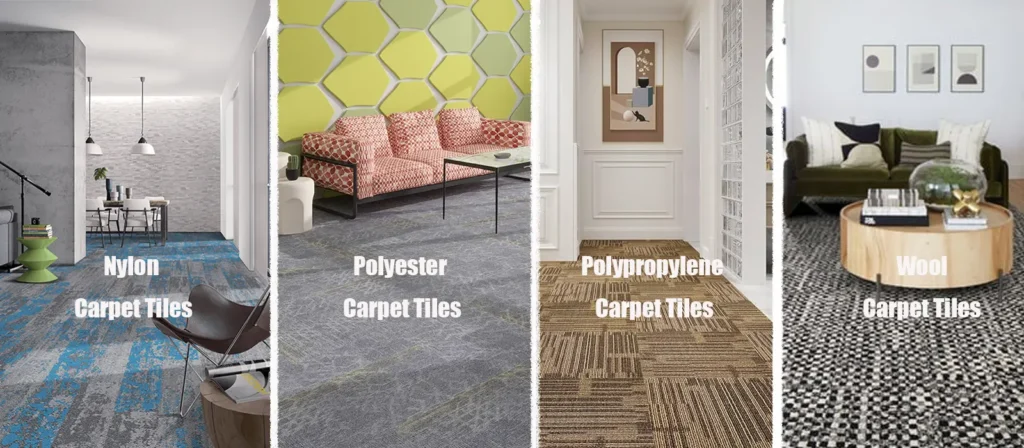
What Are Carpet Tiles Made Of?
Carpet tiles come in various materials, each offering unique durability, comfort, and maintenance benefits.
- Nylon: Highly durable, stain-resistant, and ideal for high-traffic areas.
- Polyester: Soft, budget-friendly, and available in various colors.
- Wool: A natural, eco-friendly choice with excellent insulation.
- Polypropylene (Olefin): Moisture-resistant and great for basements or outdoor areas.
- Recycled Materials: Many modern carpet tiles incorporate recycled plastics for sustainability.
Carpet Tile Styles
Carpet tiles come in various designs and layouts to match aesthetics and functional needs.
1. Cut Pile Carpet Tiles
- Soft and plush, it is ideal for residential spaces.
- Available in textured or frieze styles.
2. Loop Pile Carpet Tiles
- They are durable and resistant to wear, making them perfect for offices and commercial spaces.
- Includes Berber and multi-level loop designs.
3. Patterned Carpet Tiles
- Designed with intricate patterns for a decorative touch.
- Popular in hotels, restaurants, and high-end office spaces.
4. Peel-and-Stick Carpet Tiles
- Easy DIY installation with adhesive backing.
- Great for renters and temporary setups.
5. Interlocking Carpet Tiles
- Snap together like puzzle pieces, eliminating the need for glue.
- Commonly used for basements, gyms, and playrooms.
Carpet Tile Advantages and Disadvantages
Carpet tiles are a popular flooring solution due to their practicality and versatility. However, like any material, they have benefits and drawbacks. Understanding these can help determine whether carpet tiles are the right choice for your space.
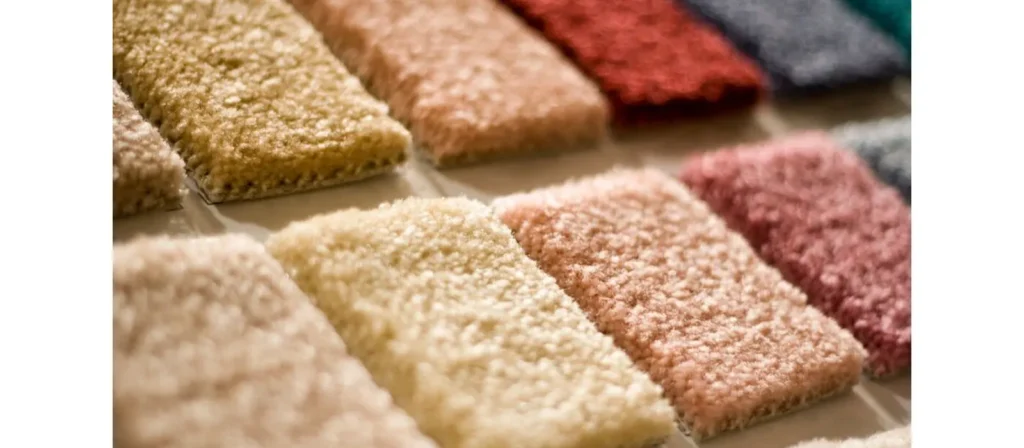
Carpet Tile Advantages
1. Easy Installation
Carpet tiles are designed for simple and efficient installation. Unlike broadloom carpets requiring professional fitting and stretching, carpet tiles can be laid down with minimal tools and effort. Many options come with peel-and-stick backing or interlocking systems, making them an excellent choice for DIY projects.
2. Cost-Effective
- Lower material waste: Since they come in pre-cut squares, there’s minimal excess material left over after installation.
- Less labor cost: The ease of installation reduces professional labor expenses.
- Long-term savings: Damaged tiles can be replaced individually, saving you from replacing an entire carpet.
3. Design Flexibility
One of the biggest appeals of carpet tiles is their customization potential. With a variety of colors, patterns, and textures available, you can create unique layouts such as:
- Checkerboard designs
- Alternating textures
- Customized logos or branding for businesses
4. Easy Maintenance and Replacement
Accidents happen—spills, stains, and wear are inevitable. Unlike traditional carpets, where a single stain could ruin an entire area, carpet tiles offer a modular repair approach:
- Replace individual damaged tiles instead of replacing the whole carpet.
- Vacuum and clean with ease since many carpet tiles are stain-resistant.
- Reduce downtime in commercial spaces, as replacing a tile is much quicker than re-carpeting an entire room.
5. Durability for High-Traffic Areas
Carpet tiles are engineered for resilience. Many options feature heavy-duty fibers and reinforced backings, making them ideal for commercial offices, retail stores, and other high-traffic environments. Some high-end carpet tiles even include moisture-resistant layers to withstand spills and humidity.
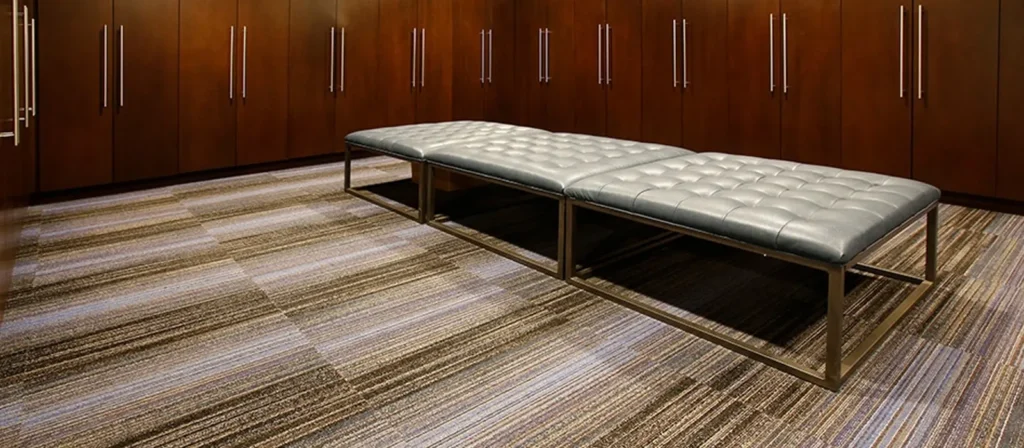
Carpet Tile Disadvantages
1. Seam Visibility
Unlike broadloom carpets, which provide a seamless finish, carpet tiles often have visible seams. While modern designs help minimize this issue, some patterns and colors make the lines more noticeable. This can be a drawback for those who prefer a continuous, uniform look.
2. Moisture Sensitivity
While carpet tiles are easier to replace in case of water damage, they are not entirely waterproof. Some lower-quality options may:
- Absorb moisture, leading to mold and mildew issues.
- Curl or loosen over time when exposed to excessive humidity.
- Additional waterproof backing is required for installation in damp areas like basements.
3. Potential for Edge Fraying
- Low-quality tiles with weak backing materials.
- Tiles with cut-pile fibers tend to fray more easily than loop-pile options.
To combat this issue, selecting high-quality tiles with reinforced edges is essential.
4. Limited Cushioning
Carpet tiles generally have thinner padding compared to traditional carpets. This can lead to:
- Less underfoot comfort, especially in residential settings.
- Reduced noise absorption unless additional padding or underlayment is used.
Carpets vs. Carpet Tiles
| Feature | Carpets | Carpet Tiles |
|---|---|---|
| Installation | Requires professional installation | DIY-friendly and modular |
| Maintenance | Stains require deep cleaning or full replacement | Easy to replace individual tiles |
| Cost | Higher upfront cost | More budget-friendly |
| Design Options | Limited to broad patterns | Highly customizable |
| Durability | Can wear out in high-traffic areas | Designed for heavy use and easy repair |
How to Install Carpet Tiles?
Installing carpet tiles is straightforward and requires minimal effort. Follow these steps:
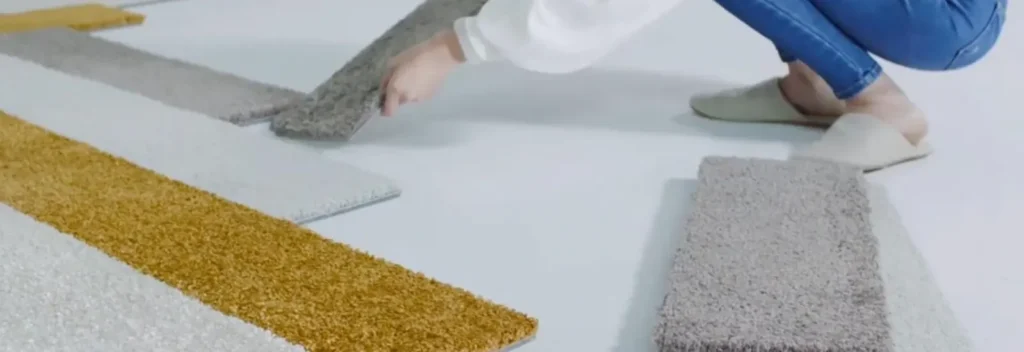
Step 1: Prepare the Floor
- Clean and dry the surface before installation.
- Ensure the subfloor is smooth and level.
Step 2: Plan the Layout
- Start in the center of the room and work outward.
- Mix different tile patterns for a unique design.
Step 3: Install the Tiles
- Peel the backing (for self-adhesive tiles) or apply adhesive if necessary.
- Press tiles firmly onto the floor.
Step 4: Cut and Fit the Edges
- Use a utility knife to trim tiles for a perfect fit.
Carpet Tile Installation Scenarios
Carpet tiles are widely used in various settings due to their practicality and ease of installation. Some of the most common scenarios include:
- Commercial Spaces: Offices, coworking spaces, and retail stores benefit from their durability and easy maintenance.
- Residential Homes: Great for basements, playrooms, and home offices.
- Educational Institutions: Preschools and universities prefer carpet tiles for noise reduction and resilience. Carpet tiles go well underneath preschool furniture.
- Healthcare Facilities: Easy to clean and replace, making them ideal for hospitals and clinics.
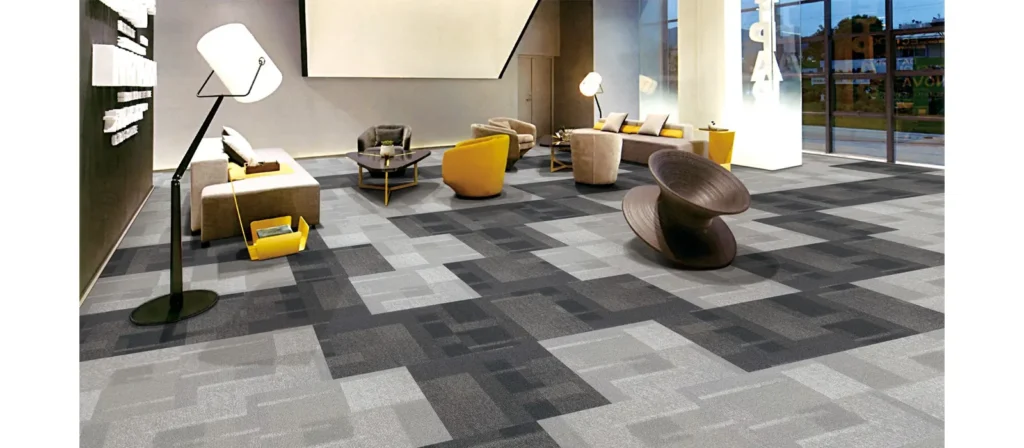
What Are Some Popular Carpet Tile Design Trends?
The latest trends in carpet tiles focus on aesthetics, functionality, and sustainability. Some notable trends include:
- Bold Geometric Patterns: Striking shapes and high-contrast designs add a modern touch.
- Earthy and Natural Tones: Neutral shades and organic textures create a calming environment.
- Customizable Layouts: Mixing colors and tile directions for unique designs.
- Eco-Friendly Materials: More brands are using recycled and sustainable fibers.
- Non-Square Shapes: Hexagonal and plank-style carpet tiles are gaining popularity.
FAQs About Carpet Tile
- Are carpet tiles easy to install?
Yes, carpet tiles are designed for easy DIY installation. Many come with peel-and-stick backing or interlocking systems, making them simple to lay down without professional help. - Can I use carpet tiles in high-traffic areas?
Absolutely! Carpet tiles are durable and great for commercial spaces. - Are carpet tiles waterproof?
Some varieties are moisture-resistant, but not all are fully waterproof. - How long do carpet tiles last?
Properly caring carpet tiles can last 10–15 years, depending on quality, foot traffic, and maintenance. - Do carpet tiles require underlay?
Most carpet tiles come with built-in backing, eliminating the need for additional underlay. - Can I replace a single carpet tile if it gets damaged?
One of the biggest advantages of carpet tiles is that you can replace individual tiles without redoing the entire floor. - Do carpet tiles need special cleaning?
Regular vacuuming and occasional spot cleaning with mild detergent are usually enough. Some carpet tiles are stain-resistant, making maintenance even easier.
Conclusion
Carpet tiles are a versatile, cost-effective, easy-to-maintain flooring solution suitable for homes and commercial spaces. Their modular design, durability, and flexibility make them an excellent alternative to traditional carpets. Whether you need a stylish office floor or a kid-friendly surface at home, carpet tiles offer the perfect balance of practicality and aesthetics.









